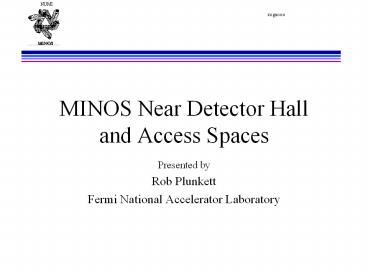xxgaooo - PowerPoint PPT Presentation
Title:
xxgaooo
Description:
Drip Ceiling. Crane Rails. Looking towards Soudan. NNNB ... Drip ceiling covers area over MINOS detector only. Remainder of hall will be quite dry anyway. ... – PowerPoint PPT presentation
Number of Views:14
Avg rating:3.0/5.0
Title: xxgaooo
1
MINOS Near Detector Halland Access Spaces
- Presented by
- Rob Plunkett
- Fermi National Accelerator Laboratory
2
Introduction
- Physical Layout of Minos Shaft and Hall
- Access to Hall
- Video of hall
- Infrastructure and Services
- Hall Environment
- Conclusions
3
Hall Schematic showing Detector and Services
Experiment Electronics
Experimental Power
Magnet P.S.
House Power
LCW Distribution
4
Hall Schematic showing Beam Envelope
Beam envelope 12 ft. diameter
Notes Beam descends at 3.3o angle Area in front
of detector has been kept clear from muon rate
considerations!
5
Elevation of MINOS Service Building
6
Details of Hall and Detector
7
Underground Schematic showing Detector
Installation Path
400 ft. shaft to end
340 ft.
8
Personnel Elevator
Elevator Characteristics
20 person capacity 4000 lb. load limit Speed
200 ft/s Size 54 x 710 (about like
highrise) Separate emergency elevator
Vertical Doors
9
Details of MINOS Shaft
Clear load space 22 ft. max.
8 ft. slot
5 ¾ ft
10
Access Tunnels showing Beam
Wider Section (downstream)
Narrow Section
11
Floor Area near Shaft
To Absorber (9 grade)
Sump trench
Elevator (separated by wall)
To Minos (level)
12
View of Hall Outfitting
Crane Rails
Drip Ceiling
Escape Passageway
Looking towards Soudan
13
Equipment Cranes
- There are cranes installed in both the MINOS
service building and the MINOS hall. - For use lowering equipment down shaft
- 15 ton capacity
- Speed 40 ft/min.
- Hook height 186
- Pitch and catch control system
- For assembling MINOS detector in hall
- 15 ton capacity
- Hook height 22 ft.
14
Installed Electrical Power
- Power in Minos Hall comes in house power and
experimental quiet power varieties. Will focus
on quiet power for now. - Sizing of capacity for quiet power in hall has
been determined by the needs of the Minos
Experiment. - Front-end electronics
- DAQ electronics
- Current experimental needs of the experiment are
served by - Two 75 KVA transformers gt 150 KW.
- Upstream panel board is sized for 600 A _at_ 480 V
or 300 KW. - Upstairs transformer is 750 KVA.
15
Pumping and Water Control
- Tunnel system will generate between 320-400
gal/min. steadily. - All water is pumped out of MINOS shaft sump.
- Target and decay pipe system drain to this point.
- Before it is removed, water will serve as primary
cooling for the underground equipment. - Pumping system based around redundancy.
- Two well pumps, each with adequate capacity to
handle job separately. - Third backup pump as well.
- Emergency generator.
16
Installed Water Cooling
- Cooling needs (LCW) of MINOS experiment include
- Direct Water cooling of front end ASIC
electronics. - Cooling of MINOS magnet.
- Cooling of magnet power supply
- Our primary cooling water supply is expected to
be the tunnel inflow. - One large unit Fan Coil (25 KW) for general hall
environmental control - 4 units for supplemental electronics cooling _at_ 7
KW each. - Heat exchanger for LCW sized for 150 KW. This is
adequate but not generous for experiment. - Little or no spare capacity
- May need to add dehumidifiers
- Loads usually come in higher than design.
- Proposals would prudently plan for additional
cooling. (My opinion). - Probably needs additional water supply
17
Expected Environmental Conditions
- Temperature in Hall will be held at 60-70 degrees
F. - Fan coil units with auxiliary heaters.
- Relative Humidity at 60
- Egress corridor maintained at positive pressure
w.r.t. hall. - Basic air flow is from corridor into the hall,
then exiting through vent to surface. - Drip ceiling covers area over MINOS detector
only. - Remainder of hall will be quite dry anyway.
18
Conclusions
- Needs of MINOS experiment will be well-met by the
MINOS service building, shaft, and experimental
hall. - Services have been sized to be appropriate. No
extra cooling capacity. - Beam itself enters at an angle. Upstream section
of hall has beam center about 10 feet above
floor. - Experiment has specified a stay-clear drift space
of 40 m upstream of detector, and this is
reflected in the civil construction. Material in
this area would require extensive simulation to
understand its effects.































